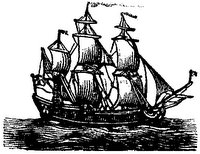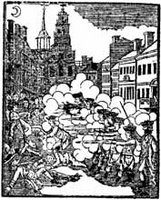 Yesterday I wrote
Yesterday I wrote about how the Massachusetts Provincial Congress took on functions of a government in the several months before the Battle of Lexington & Concord. Today's posting tackles how historians describe that effort. This isn't so much a
"myth" as a question of semantics, but I think it gets to the core of the political dispute that led to war.
Some writers describe the Provincial Congress as acting as a government, but imply that it shouldn't have. For example, a Portland, Maine, school offers this
definition of the congress: "started in 1774, illegal government that controlled all of Massachusetts except Boston..." The WPI military science program uses the more delicate term "
extra-legal."
I don't like either label is necessary, or necessarily wise. Americans in particular should bear in mind how the Declaration of Independence defines a government's legitimacy: "...Governments are instituted among Men, deriving their just Powers from the Consent of the Governed..." By that standard—"the Consent of the Governed"—how does the Provincial Congress compare to the authority of the Crown?
Here's how Massachusetts usually elected the lower house of its legislature. Each spring, a typical town would have a meeting to choose two representatives to send to the General Court. Very small towns, with fewer than 120 votes, could send only one representative, and didn't have to send any. Boston, being so large, was allowed to send four—though that still left its citizens underrepresented according to their
population. (Click on the map above for a larger image of New England at the start of the war, brought to us by the
University of Georgia library, to see where towns lay in Massachusetts. Remember the province then included Maine.)
In some towns, especially those farthest from Boston, the inhabitants either couldn't convince anyone to leave his farm to attend the legislature, or didn't think it was worthwhile paying a gentleman's expenses. Towns that could send two men often sent only one. Towns of moderate size were supposed to pay a fine if they sent no one, but in practice that penalty never seems to have been levied. After all, the fewer towns represented in the Assembly, the more clout fell to each representative who did attend, so no one had a real incentive to enforce the law. As a result, only about two-thirds of the towns participated in a typical General Court, according to
John J. Waters, Jr., in
The Otis Family in Provincial and Revolutionary Massachusetts.
In the summer and fall of 1774, Massachusetts towns chose delegates to the First Provincial Congress in much the same way they elected representatives for the General Court, by gathering and voting in town meetings. There were no ground rules for a congress, so towns elected different numbers of men. Some chose the same gents to go to the legislature and the congress; others chose separate delegations in case the bodies met simultaneously, and all those men ended up at the Provincial Congress.
And here's the detail I think is crucial:
More towns sent delegates to the Provincial Congress than had sent representatives to the recent General Courts. According to the congress's records of its first session in Salem on 7 Oct 1774, over 180 towns were represented while only 21 had no delegates. Furthermore, more men were there overall. As
Stephen E. Patterson describes in
Political Parties in Revolutionary Massachusetts, there were 293 delegates to the first congress in Concord, about twice the legislature's usual crowd.
In other words, even though towns had been legally obligated to represent themselves in the General Court, many chose not to. Even though towns had no legal obligation to this new Provincial Congress, and were defying the royal governor by supporting it, more chose to participate. And rather than representing only a political elite who always made up General Courts, the congress included more men (albeit also from the elite). The Provincial Congress was thus a
more representative, broader-based body than the preceding legislatures.
In contrast, Gov.
Thomas Gage, his
lieutenant governor, and his "new-fangled" Council (the upper house of the legislature, redefined in 1774 by Parliament) were all appointed by the
king and ministers in London. Those ministers were pulled from Parliament, which (vaguely) represented the views of British voters. The king came by his authority by being the oldest male patrilineal descendant of
George I, who was chosen because he was the closest Protestant relative of Queen
Anne, who in turn was the oldest surviving child of
James II, who had been kicked out...and so on, back through all those
history plays by Shakespeare.
Of course, most ethnically British people in Massachusetts and elsewhere in the British Empire still believed in the legitimacy of that London government. They still believed that a Parliamentary system under a monarch was their best chance of preserving their natural rights. American Patriots felt that Parliament had become corrupted, hence their decision to defy its appointees in New England, but few were ready to break away and create an entirely new system. The Provincial Congress still proclaimed its loyalty to the king.
Therefore, I think the best description of the situation in Massachusetts in April 1775 is that the province had two rival governments, one created by the local people without approval from the king and Parliament, and one created by the king and Parliament without approval from the local people. Congress supporters controlled the countryside through sheer numbers; the royal governor controlled Boston and a couple of outposts through armed force. The congress had natural-rights philosophy on its side; the Crown had the important force of tradition. So which government had a better claim to legitimacy?
Well, that was what all the fighting was about, wasn't it?




